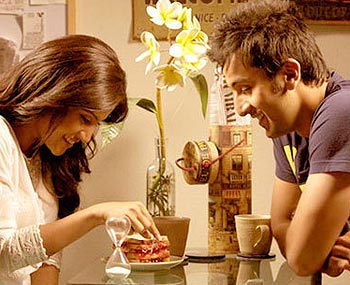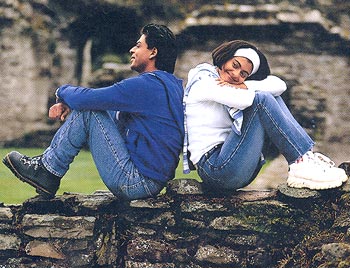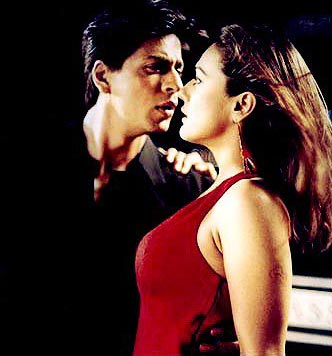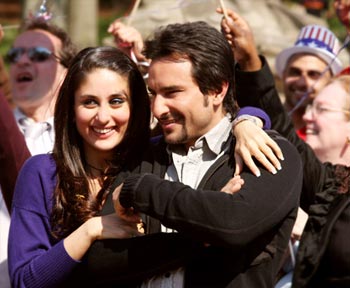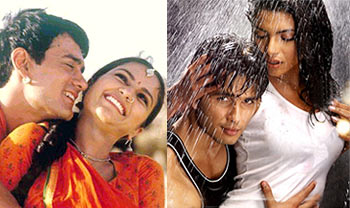 | « Back to article | Print this article |
'I wouldn't have produced Lagaan'
In parts one and two of Karan Johar's conversation with Raja Sen, the filmmaker spoke about honesty as a filmmaker, stars and image, screenwriting woes peculiar only to our cinema, and lots more.
In this final part of the interview, Johar speaks of creating worlds as a writer, the moment he first realised he could actually direct films, and how he wouldn't have produced Lagaan.
Are you a very hands-on producer?
No. I have no sense of economics. I have no sense of money handling. My CEO is my oldest and best friend, Apoorva, who's been with me through school and college. He takes care of all of that. He sits in my father's chair now, so it's a given that he does everything and I don't even know what to do. I was a 90s student in every subject besides Mathematics, and there was always a 32 or a 34 in that one. In my ICSE exams I had five 90s and one 40, and that's the way it is with me. Signing cheques is also an issue, I don't know where the signature has to go half the time. I stare at that one line. It's still not something I'm used to.
I remember the fourth day after I lost my father. I walked into this room and a gentleman walked in and said, 'Hi, I'm your chartered accountant, we've never met.' And that pretty much sums up my financial and monetary cluelessness. So if anyboy wanted to take me for a ride, I'm the best victim possible (laughs).
I meant as a filmmaker, with all these young boys making movies for you.
Well, Apoorva keeps them all away from me because whenever they ask me for something, I just say yes. But I'm hands on creatively. I sit with them on the screenplay till I think it's ready to shoot. But I stay away from the sets because I feel I shouldn't be there. Unless I go to meet them or the actors socially, I just don't go to the sets.
I'm hands on but I consciously make an effort to let go. I remember when Ayaan (Mukerji) was discussing the music of Wake Up Sid he started using words like jazz and blues and something he started saying, and I said all this I don't know, and I'll come and screw it up for you, put a louder beat or something. So I told him that the world of Wake Up Sid is yours, and I don't want to yank you out of your vision. So even if I don't like the songs, go ahead.
Originality is running low in the industry today with most filmmakers cashing in on sequels and remakes, trying to build everything into a franchise. You haven't gone the remake way yet. Is this a conscious move?
There are many films that I'd like to do, but I don't know if I could do them better. I think I would only remake a film if I know for a fact that I could get it right, and you can never know that. I'm adapting Stepmom officially and that's the director's vision, and I'm all for it. Tarun is directing and adapting Agneepath for me, and he came up with a great idea of how to adapt it, to set it in today's time. I liked the idea.
I love so many films, and there are so many stories I wished I could tell, but I don't know if I could do justice to them. I don't venture into that territory. I don't want to be told, 'why did you do it? It was so much better the first time.' It's the fear of failure that keeps me away from that sphere.
'I only like Hindi film music or whatever's playing on the radio stations'
What excites you as a writer? When you start out writing a script, what's the big kick for you?
Creating worlds. It's almost like a power you have. The closest we all come to being God is when we're a writer. You just make things happen. You make a life, you destroy a life, you make them pick up their pieces. You do so much. It's so, so challenging. I love it.
And since your cinema is so personal, is there a lot of yourself in your characters?
Always. They're all behaving and talking like me. Which is bad or good, I don't know, but if I'm writing a script somewhere they'll all be me. That's something you can't run away from. Either subconsciously or very externally, the characters will always be a reflection of the writer's personality.
You balance a million different hats; you do a lot more than making films. As a writer is it difficult to find time to create that world? Do you set aside specific times for different kinds of work?
I kind of work when I work. Whenever I'm doing anything, I'm writing in my head. Sometimes at a meeting, during a work-trip, on a flight.. I think the only thing I know is filmmaking. I don't know or care for anything else.
It's not like I have a heavy personal life to go back to, or if I have anything else to invest in. I'm not a holiday person. I don't have any desire to go to the mountains or the beach or take off for a month to find myself. I've found myself. All I do is think about movies I want to make. Getting them right or wrong is not really the criteria, I just feel that's all I want to do. To keep working, keep meeting talented technicians and actors, keep making movies. Talk shop, all the time.
I'm not even such an avid watcher of films. I don't watch as many films or read as many books. I watch films, but I'm not one of those people who'll collect DVDs, or rush to the cinema for one film or follow it on IMDb and know if it's coming out 'in the fall of' whatever. I'm travelling a lot so catch films invariably all over the world.
So you'd rather create films than watch them?
Yeah. People look at me and say 'you must read a lot.' I don't read at all. I only like Hindi film music or whatever's playing on the radio stations when I'm travelling. I don't listen to music at all. I have this thing but.. [fumbles with iPod and dock, gives up, laughs] I'm also technologically challenged.
So there's a lot that people don't know about me. I'm really, really happy in my head, in my alone-space. Which is where I constantly think about films. But there's nothing that drives me, in the sense that I'm not passionate about music or cinema. I'm just passionate about what I want to go on set and do. I think I'm a Gemini, so I'm a little mixed up like that.
Fashion designer, television host, writer, producer, and occasional actor. Is it then safe to say that the Director role resonates strongest within you?
Yeah. There's too much pressure on deliverance, but everything else is a hobby. I love directing, and I love what comes with the territory. I love the glamour, the showbiz in-your-faceness. That's why I've done everything, and so unabashedly. Sometimes people might think 'he's weird, why is he doing so many things?'
Five years ago, I was told 'why are you doing this? A director should have a mystical quality, you should be intense, somethings should be kept to yourself and that's why actors should respect you.' I think actors will respect you if you do good work. Hosting a talk show, endorsing a brand or hosting an awards show... these are hobbies, and I love it! I love walking the red carpet. It's something I was attracted to as a child, so now I feel a sense of triumph when I do it.
'I dabbled with the idea of becoming a fashion designer'
Did you always have this clarity of wanting to be behind the camera, to direct?
I wanted to be a celebrity. I decided I would be somebody that the world knew. I just decided that had to happen, and I didn't care how it would happen. I think I sent that energy out into the universe (laughs), wished for it on a daily basis. I think it was when I left school that I decided to be somebody of public prominence, you know?
I dabbled with the idea of becoming a fashion designer, then for some time I thought I'd be a copywriter in the world of advertising. Then I thought maybe I should act, do stage, do theatre. I hadn't thought any of it through, but direction was not really one of them. I thought movie-making is not something I'm tuned into, but it's run its course and I'm happy with what's happened. It's something I thought I wasn't capable of doing, of directing a whole film.
So when did that epiphany come? That moment you realised that you could, in fact, direct a film?
It happened when I started assisting on Dilwale [Dulhaniya Le Jaayenge], and I felt that this was something I could perhaps do. I just thought it would be much tougher than it was.. And it is tough, I don't mean to undermine what we do as directors, but I thought 'oh, this is what it is.' (Laughs) I don't know what I'd envisaged, but when I was an AD on that film I thought, 'oh, I may be able to do this.'
So the next step was writing. And who had ever written a film? So I started that and it was quite organic, the flow wasn't as bad. It just seemed much better than I'd imagined.
Would you ever write a film and let someone else direct it?
I have. Kal Ho Naa Ho [directed by Nikhil Advani]. But it was a tough experience, and I don't think I'd do it again. And therein lie internal problems. When you write something on your own, and you're a director yourself, there's no reason to... I don't know, I may do it -- never say never -- but only if it was something special. Like if someone I respected requested me to write a film for them, and I was close enough to them and I feel I should just do it. Or if it was just not my idea and I had the time to spare. But I don't see that happening in the next few years.
Do you look back on your films a lot? Try and rewatch and figure what you'd have done differently, maybe pat yourself on the back a bit?
You know, I really can't sit through most of my films. I look at them and I cringe. A lot. But then I cringe at the rushes of my new films also. When I look at them, I can see a definite graph that is a reflection of my state of mind on each film. I can almost see what I was thinking at that point of time.
You must understand that with directors like me and Adi [Chopra] and Sooraj [Barjatya], we were in a zone where we were new and there was an old zone, and we ventured into a zone where the new zone came in, and we had to come back to being who we were, but we'd adapted earlier to match that time. We're the only 3-4 people who were in that transition phase.
So when I was making Kuch Kuch Hota Hai, I had to appeal to a Delhi-UP distributor and a CPCI exhibitor, and then I went into a zone when suddenly they didn't matter and new audiences and new intellectual belief came in. So there was a bit of a shake in our mental makeup. So it was always going to take time for us to adjust to being who we really were.
'After 12 years of working I think I'm only now finally finding my space'
Which is who? In the sense, when you look at Kuch Kuch Hota Hai and the others, how much of them is an adjustment from who you were?
Inherently, when I directed Kuch Kuch Hota Hai, I was different and I was changing myself to reflect that time. When I wrote Kal Ho Naa Ho, I had just seen Dil Chahta Hai and I said 'look, this is a really cool film and it's cool grammar, and I think it's something I can do.'
And it's something I hadn't tried before because I didn't think it would work and now I attempted something cool and -- barring the last 20 minutes of Kal Ho Naa Ho which is far from cool and very overdramatic -- I think upto a point we had managed a certain new language in the film and reached that romcom space the way Hollywood does, in a way. Cross-cutting narratives, split screens. I wrote that and I knew I'd be able to, but I'd curbed my instincts much earlier because I felt that is not what the Delhi-UP distributors would like.
My father had drilled it into me, you know? That you have to have this, and there should be a buffer scene after the interval, and there should not be a slow song pre-climax... you know, you're tuned into certain things. Having said that, after 12 years of working I think I'm only now finally finding my space, catching up to who I am, today.
So filmmaking today comes with lesser concessions, lesser compromise?
Yeah. We're thinking more about cinema as a larger entity, as opposed to a micro-entity and thinking about appealing to quarters. We're seeing it in a far bigger fashion.
As a producer, are you then seeing the new directors automatically finding their own skin and voices, without having to adjust?
It depends on the kind of director. Ayaan [Mukherjee] is different from Renzil [D'Silva]. And Punit [Malhotra] is making a film that is your quintessential romcom with an edge, I Hate Luv Stories. And you might think that it's still a love story, and yeah it is but I like its energy. And that'll again go into the Dharma space a bit more, so it'll go up and down depending on the director. It's not that I make some conscious decision to go against the grain. No. Let the director decide what he wants. Don't adjust to me, my company or what people think out there. Do what you have to, screw up or get it right.
It's funny how you refuse to work with newcomer actors but conversely you refuse to work with established directors.
Yeah, now that is a conscious decision. I think the rawness, innocence and hunger only comes in that space. And once they're established, I'm also a director and there'll be an ego-dynamic. We'll have a point of conflict, so why do we even go into that space? You've made three films, don't come to me, I'm not interested.
' I was blown away by Kaminey'
You've spoken about your admiration for films like Kaminey and Rang De Basanti, even though they're well outside your current space. Would you be open to producing films like those?
No, because I may not have understood it on paper. I may not have bought Kaminey as a script because I may not have been able to judge it. I didn't understand parts of the film but it really, really excited me. I was blown away by the film, by the music, by Shahid and Priyanka's performances.
But I would not have produced Lagaan and Rang De Basanti either. They're magical on celluloid, but on paper they might have read really strangely, who knows? And I may not have had the foresight to predict what would happen.
Are there times when films work really well on paper, but translate really badly on screen?
All the time. Don't they? You know this. (laughs)
Fair enough, but in your case, as a producer. Have they all turned out pretty much the way you expected them to?
Barring Kaal, which I didn't read only on paper because I get scared of horror films, and had no understanding of the genre. And that is something I think I'll never do again. Like a sci-fi film I'll never produce, or a horror film. Or a film not in the real world, like a Lord Of The Rings or a Harry Potter. I don't understand them. I like to watch human beings who you can take a blood test for, and not some strange android or whatever, I have absolutely no interest. Kaal was more of an investment in [director Soham Shah's] sense of energy and hard work, but it was something I was never clear about.
Did you literally not read the script?
I did, but I didn't know at all. Was it scary? Maybe it was, I didn't know. I have no sense of horror, anything scares me. A dog barking loudly in the background, and I'm on the edge of my seat. I'm the wrong person. And now I only want to do what I understand.
